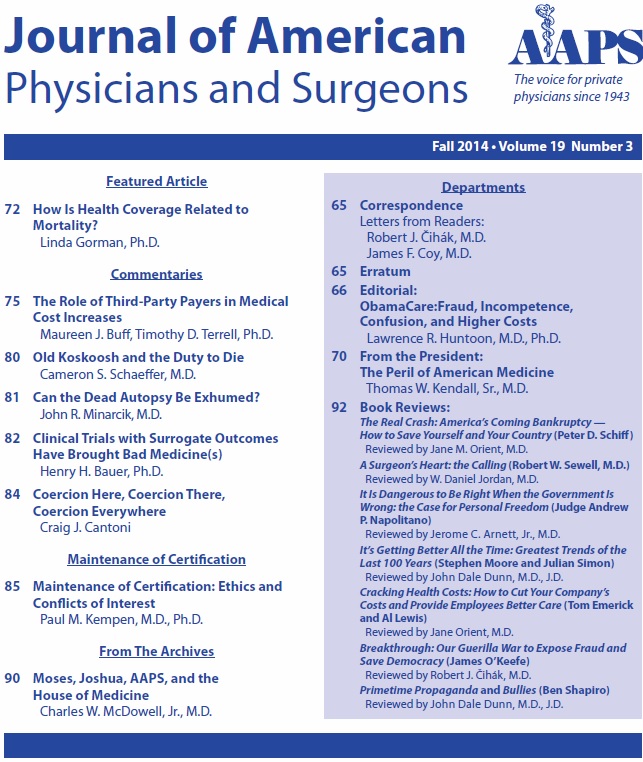Journal Of American Physicians And Surgeons

Imagine a crisp autumn morning, sunlight streaming through the window, illuminating stacks of medical journals. Doctors across the nation, fueled by coffee and a desire to serve, pour over research, debating best practices and novel approaches to patient care. Among these publications, one stands out, perhaps a bit controversial, but undeniably committed to a particular vision of American medicine: The Journal of American Physicians and Surgeons (JPANDS).
JPANDS, published by the Association of American Physicians and Surgeons (AAPS), presents a unique perspective on healthcare. While often at odds with mainstream medical thought and frequently criticized for its conservative stances, it remains a significant voice in the ongoing dialogue about healthcare policy and medical practice in the United States, sparking both fervent support and equally passionate opposition.
A Deep Dive into JPANDS
To understand JPANDS, one must first understand its parent organization, AAPS. Founded in 1943, AAPS champions the idea of private medicine and opposes government interference in healthcare. Their mission, as stated on their website, is to "protect and promote the patient-physician relationship and the practice of private medicine."
This philosophy permeates every page of JPANDS. The journal features articles covering a wide range of medical and political topics, often with a strong emphasis on individual liberty and limited government intervention.
Historical Context and Evolution
The origins of AAPS can be traced back to concerns among physicians about the growing influence of government in healthcare during the mid-20th century. The organization positioned itself as a defender of the traditional doctor-patient relationship, advocating for fee-for-service medicine and opposing government-run healthcare systems.
Over the decades, AAPS and, by extension, JPANDS have consistently voiced skepticism towards managed care, the Affordable Care Act, and other government initiatives aimed at expanding healthcare access. They argue these interventions lead to decreased quality of care, restricted physician autonomy, and increased costs.
Content and Focus
The content of JPANDS is diverse, encompassing clinical research, policy analyses, and opinion pieces. Articles often explore controversial topics, such as vaccine safety, the role of government in regulating pharmaceuticals, and the potential negative consequences of electronic health records.
The journal has published articles questioning the scientific consensus on certain medical issues, leading to criticism from mainstream medical organizations. For example, JPANDS has featured articles promoting alternative treatments for diseases and expressing skepticism about the link between HIV and AIDS.
One area of consistent focus is the potential for government overreach in healthcare. JPANDS frequently publishes articles highlighting instances where they believe government regulations infringe upon patient privacy or physician autonomy.
Controversies and Criticisms
JPANDS has faced significant criticism from the medical community. Many accuse the journal of promoting pseudoscience, spreading misinformation, and lacking rigorous peer review.
Organizations like the Southern Poverty Law Center have labeled AAPS as a radical group, citing the organization's association with individuals who hold extreme views on race and immigration. These accusations have further fueled the controversy surrounding JPANDS.
The journal's editorial policies have also come under scrutiny. Critics argue that JPANDS has a bias towards publishing articles that support its predetermined ideological positions, rather than adhering to objective scientific principles.
Furthermore, the journal's peer review process has been questioned. Some allege that the reviewers are selected based on their alignment with the journal's political views, rather than their expertise in the relevant scientific fields.
Defenders and Supporters
Despite the criticisms, JPANDS maintains a loyal following among a segment of physicians and healthcare professionals. Supporters appreciate the journal's willingness to challenge conventional wisdom and offer alternative perspectives on healthcare issues.
They argue that JPANDS provides a platform for voices that are often marginalized in mainstream medical discourse. Proponents believe the journal plays a vital role in promoting intellectual diversity and fostering critical thinking within the medical profession.
Many supporters are drawn to JPANDS's emphasis on patient autonomy and the importance of the doctor-patient relationship. They see the journal as a defender of traditional medical values in an era of increasing corporatization and government regulation.
Impact and Significance
While the exact readership of JPANDS is difficult to determine, its influence extends beyond its subscribers. The journal's articles are often cited in conservative media outlets and policy debates, shaping the narrative surrounding healthcare reform and medical freedom.
AAPS, through JPANDS, actively lobbies policymakers and advocates for its preferred healthcare policies. Their efforts have had a tangible impact on the political landscape, influencing legislation and shaping public opinion on key healthcare issues.
The journal serves as a rallying point for physicians who are concerned about the direction of American healthcare. It provides a sense of community and a platform for sharing ideas and strategies for resisting what they perceive as government intrusion.
The Future of JPANDS
The future of JPANDS is uncertain, as the healthcare landscape continues to evolve. As the debate over healthcare reform intensifies, the journal is likely to remain a vocal and controversial voice in the conversation.
Whether JPANDS can overcome the criticisms it faces and broaden its appeal remains to be seen. However, its unwavering commitment to its core principles suggests that it will continue to play a role in shaping the future of American medicine for years to come.
It's a journal often at odds with the established norms, but one that consistently ignites conversation and challenges the status quo in the ever-evolving world of healthcare. This makes JPANDS a noteworthy, if controversial, publication in the American medical landscape.


















